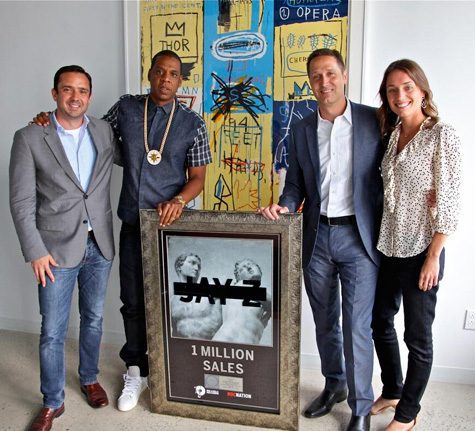2013. JAY-Z releases his highly anticipated album, Magna Carta... Holy Grail. Four days prior to digital download on iTunes and many other stores, Samsung releases the "Magna Carta" app, an application featuring the album in .mp3 files and behind the scenes footage. How it worked was: Samsung bought a million copies of the album in advance for the album's release, and the user that downloaded the app shared their data in order for Samsung to share it, a way for Samsung to make their money back.
Users were worried that the Samsung app was made purely for data sales, and they were right. In return for what most said was a subpar album, they had (allegedly) location history, phone number and likely a lot more. Although the album had hit singles such as "FuckWithMeYouKnowIGotIt" with Rick Ross, "Oceans" with Frank Ocean, and "Heaven" with Justin Timberlake, the value of each user's data was worth much, much more, making a not so great return.
CEO Michael Darviche of the now-rebranded data marketing firm BlueCava, said "it's probably worth $25,000 every time they sell it." This means that the data they sold was worth $25,000, and with free roam to sell to any and every company that wants it. In 2013, there was approximately 250,000 data suppliers, so for a total of $10M+ put into the app, there was a total supply of $6.25B of data in circulation. A great decision for Samsung.
So what can we actually get from this? One of the biggest tech giants of all time Samsung made a great (yet shady) decision, in return for many people fearing for their privacy yet keeping a free album, but nothing actually mattered. Every company already has your data. Whether you actually downloaded the app at the time or not, you already gave this data to Apple, Google (even the amount of time you read this is being sold to data marketing companies for $0.025) and other companies, you don't need to worry about your privacy. You still have none.
Users were worried that the Samsung app was made purely for data sales, and they were right. In return for what most said was a subpar album, they had (allegedly) location history, phone number and likely a lot more. Although the album had hit singles such as "FuckWithMeYouKnowIGotIt" with Rick Ross, "Oceans" with Frank Ocean, and "Heaven" with Justin Timberlake, the value of each user's data was worth much, much more, making a not so great return.
CEO Michael Darviche of the now-rebranded data marketing firm BlueCava, said "it's probably worth $25,000 every time they sell it." This means that the data they sold was worth $25,000, and with free roam to sell to any and every company that wants it. In 2013, there was approximately 250,000 data suppliers, so for a total of $10M+ put into the app, there was a total supply of $6.25B of data in circulation. A great decision for Samsung.
So what can we actually get from this? One of the biggest tech giants of all time Samsung made a great (yet shady) decision, in return for many people fearing for their privacy yet keeping a free album, but nothing actually mattered. Every company already has your data. Whether you actually downloaded the app at the time or not, you already gave this data to Apple, Google (even the amount of time you read this is being sold to data marketing companies for $0.025) and other companies, you don't need to worry about your privacy. You still have none.





